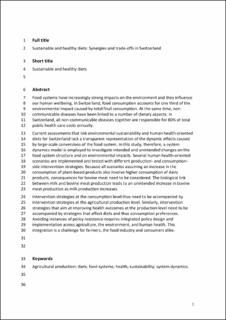| dc.description.abstract | Food systems have increasingly strong impacts on the environment, and they influence our human well-being. In Switzerland, food consumption accounts for one-third of the environmental impact caused by total final consumption. At the same time, non-communicable diseases have been linked to a number of dietary aspects. In Switzerland, all non-communicable diseases together are responsible for 80% of total public health care costs annually. Current assessments that link environmental sustainability and human health-oriented diets for Switzerland lack a transparent representation of the dynamic effects caused by large-scale conversions of the food system. In this study, therefore, a system dynamics model is employed to investigate intended and unintended changes on the food system structure and on environmental impacts. Several human health-oriented scenarios are implemented and tested with different production- and consumption-side intervention strategies. Because all scenarios assuming an increase in the consumption of plant-based products also involve higher consumption of dairy products, consequences for bovine meat need to be considered. The biological link between milk and bovine meat production leads to an unintended increase in bovine meat production as milk production increases. Intervention strategies at the consumption level thus need to be accompanied by intervention strategies at the agricultural production level. Similarly, intervention strategies that aim at improving health outcomes at the production level need to be accompanied by strategies that affect diets and thus consumption preferences. Avoiding instances of policy resistance requires integrated policy design and implementation across agriculture, the environment and human health. This integration is a challenge for farmers, the food industry and consumers alike. | en_US |
